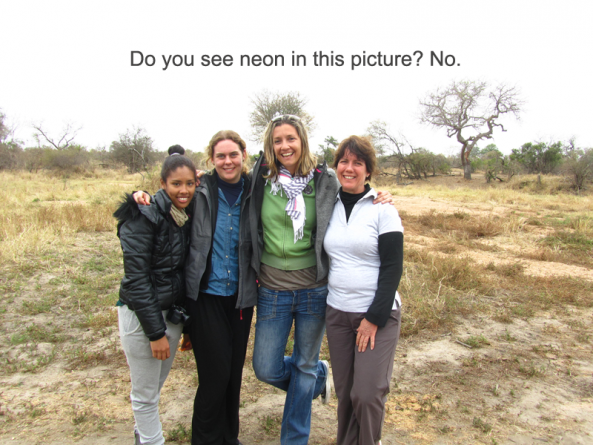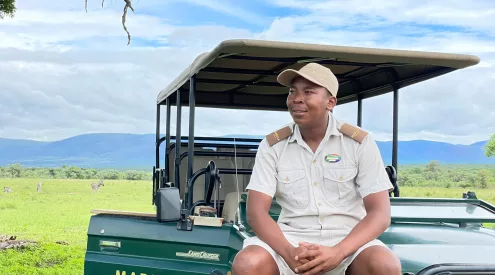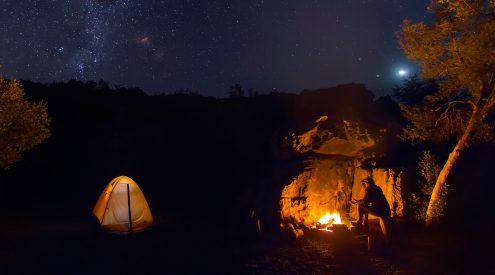Before the age of five we have the ability to determine between right and wrong. It’s a behaviour that we learn from our immediate environment. As we mature, we develop a certain etiquette that kicks into play when we’re sitting in a restaurant, out shopping or chilling (er, working?) in our office cubicles. Given our unique backgrounds there are those of us that slightly more eccentric and have blurred lines of what’s socially acceptable and what’s not. Either way, there’s a certain social line that you do not cross. So, you’re probably wondering where I am going with this? Well, it’s simple.
This sense of socialization is ALSO applicable when you’re going on a game drive. Believe it or not, there’s an etiquette that needs to be adhered to out of respect for your fellow guests while on safari. Before embarking on your dream African safari, try tap into that learned behaviour of yours and remember – a safari holiday is not the same as a holiday in Amsterdam.
Respect your guides, the community, the locals and your guide. Here are my top eight tips on how not to behave on a game drive while on safari.
1. Remark on the size of the Big Five’s genitalia
Really? Why do people do this? One sardonic, witty comment can be humourous but consistent loud comments about the size of an elephant bull’s thing-he-makes-babies-with is just plain uncouth. I’m no prude but you do not know the background, culture and environment of your fellow guests. If you’re on a game drive with a group of friends it’s a different story.
And no, the Big Five are not so named because of the size of their genitalia. They’re called the Big Five because they were they most dangerous animals to hunt on foot.
Wild animals are well endowed. End of story. If you’re on a game drive keep the “oh he has a big one” comments to a minimum. It gets tiresome.
2. Sit on your mobile phone
Hipsters, teenagers and Apple fanatics – leave the cellphone behind. I know it’s vital to find out if one of the Kardashians has got married but realise that you’re in the midst of something that can change your outlook on life. You’re at one with the bush where there are no pretenses and no outside distractions. Being on safari is an opportunity to immerse yourself in the natural world. Technology distracts you from dealing with real issues – now is your time to regenerate and process.
Only take your phone with if you’re planning to use your camera. Wait until you’re back at the lodge to Whatsapp your friends about the “totes amazeballs ellie and warty warthog just spotted. LOL”.
Don’t let your slew of WhatsApp and Facebook alerts ruin these moments for you and your fellow safari passengers. Let Africa get into your soul without the injection of noisy technology.

3. Get out of the safari vehicle
Your qualified ranger understands that safety is paramount so it’s vital that you listen him/her. NEVER get out of the vehicle unless instructed. If nature calls ask him to stop. He will find a safe spot and check the perimeter for predators. Your ranger may stop the vehicle at a kill or to observe a herd of buffalo. This is not a sign to disembark. Animals are used to vehicles and actually see it as one unit. This is why you should never hang your limbs over the side of the vehicle.
Lions appear docile, elephants come across as being cumbersome, buffalo give off a vacant stare and there’s a certain nonchalant atmosphere about a leopard; but they’re all predators who can attack in the blink of an eye.
There are times when it is safe to exit the vehicle for a toilet, tea or drinks break. Your guide will lead the way.
Limbs are very useful items to have on one’s body, so try to keep them. All you need to do is listen to the person in khaki.
4. Be obnoxious
If you’ve never worked as a safari guide, lived in Africa or studied wildlife, then refrain from being the “know-it-all” on the vehicle. If you are proclaimed expert in a particular area then contribute your knowledge in a humble manner. Ask questions and be inquisitive but don’t insist on arguing constantly.
If your fellow passengers are listening to their khaki-clad guide imparting on useful facts; don’t interrupt with obnoxious statements like “you’re actually wrong because I went to the zoo once and I read on the interwebs that …”
Your guide is not God, he may have slipped up with a fact or two. Find a way of tactfully offering up alternative information.
5. Demand sightings and complain
You will be amazed at how many spoilt westerners complain about the wildlife they see. So what? You didn’t get to see the elusive cheetah but you did learn about how to track animals in the wild and “read” the bush. Bear in mind, this is the African Bush and not a zoo. Wildlife migrates and traverses hectares of land. They move between reserves and sightings are never guaranteed. History is the best predictor of the future so we rely on the ranger’s experience of where prides were previously seen. Trackers understand that wildlife are creatures of habit and will always try to find the animals you would like to see.
Rangers in different vehicles are able to alert one another when something exciting has been spotted. My advice? Tell the rangers what you would like to see. He may just have spotted wild dog and head to those co-ordinates first or change his route slightly.
Raise your hand if you hate wingers on safari. Don’t be one.
6. Watch the clock
Expect a game drive to last roughly three hours. You will stop for a sundowner and snacks where you’ll be allowed to jump off the vehicle. On morning game drives you stop for a coffee break. Game drives may last longer than three hours. If there is a lion kill or a rare sighting your ranger will stop. If you’re a stickler for timekeeping, you’ll need to relax a bit more. However, rangers always stick as close as possible to the allotted time – they wouldn’t want you to miss your boma dining experience.
Don’t be a Timmy Timechecker, allow for a bit of leeway. You’re on holiday after all!
7. Disrespect the locals
Not all cultures speak your language and just because they don’t understand you, doesn’t mean they’re deaf. Speak slowly and try to learn a few words from the local dialect. Not everyone follows a western way of living so please be patient and open-minded. Broaden your horizons, learn to live simply and appreciate the small things that surround you.
Spending time with locals will give a new perspective on your own life and you’ll learn a lot.
8. Wear neon colours
It goes without saying that while on safari you need to wear comfortable clothes and bland colours. Yes, I’m talking khakis, olive greens and navy blue. Flat walking shoes, fleece top, light jackets and cotton trousers should also do the trick. Bring something to keep yourself warm at night and in the mornings when it gets bitterly cold.
A large proportion of your time will be spent bouncing up and down in a vehicle in the searing African heat spotting wildlife. Lions and honey badgers don’t care if you’re wearing a sequin Guess top and pretty jewel encrusted pumps. You need to blend in with the bush so leave the 80’s neon clothes and skanky threads at home.

This post is brought to you by Sun Destinations, who handle the marketing and reservations for a selection of Africa’s Hidden Secrets. Check out Sun Destinations on Google+ and Sun Safaris on Facebook, Twitter, and Pinterest.


















